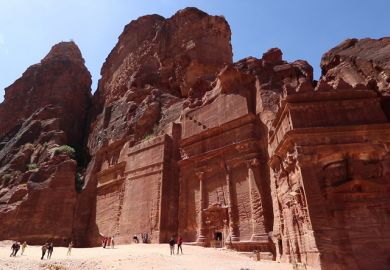Since this book came to hand, and with the advent of the London bombs of July 7, there has been much heart-searching on the nature of Britishness. It may well be that a deep historical dimension can add something to our understanding, if we are British, of who we are and how we came to be so. But this "who" question is a very difficult one that anthropologists and sociologists have striven to pin down yet which often remains elusive. For it centres on the notion of personal identity, where identity is defined not only in terms of being like (if not quite identical to) some people, but also in terms of being distinctly different from others.
Every aspect of identity is debated in contemporary British society, and not simply those aspects that might be regarded as "tribal", which are equivalent to what anthropologists may term "ethnicity". In the postmodern world, the categories of identity become less rigid. Gender is no longer a matter of two defined sexes: such issues become negotiable and mutable. Age boundaries become more fluid: ageism is criticised and the age of consent is debated.
David Miles approaches these matters with the eye of a historian and indeed of an archaeologist. He was for five years chief archaeologist of English Heritage, and before that director of the Oxford Archaeological Unit, so his experience of the archaeology of England in particular is vast and his historical knowledge extensive. He has directed or participated in excavations relating to most of the periods with which he deals, from the prehistoric period to the urban archaeology of our medieval and premodern cities.
His treatment is broadly chronological, with a first chapter on the early (Palaeolithic and Mesolithic) hunter-gatherers, a chapter on the first farmers and their prehistoric aftermath, then a chapter on the Romans in Britain. "New tribes, new kingdoms" deals with the Anglo-Saxons, followed by "The Viking legacy" and the Norman conquest. "Changing worlds" deals with the medieval period, and "Expanding horizons" with the time of the Tudors. Two more chapters take us to the mid-19th century. Then "Living in the city" deals with the great urban expansion of the past 150 years, and "New Britons" with the immigration of the past century. The narrative is rich in detail and in anecdote, enriched by the author's wide experience of England and things English.
The "Where do we come from?" question is addressed in some detail. The author draws on developments in molecular genetics to try to give some answers in terms of what is sometimes called archaeo-genetics. But there he is hampered by the relative immaturity of a field of study that has been producing useful data for only about a decade. In another decade, we shall probably be a lot closer to writing an outline demographic history of Britain, giving approximate numbers perhaps to immigrants at different periods and answering some of the longstanding archaeological arguments about migration (of people) versus diffusion (of ideas). Miles certainly marshals the historical evidence well, both the written narratives and the material documentation from archaeology, to give a clear outline of current knowledge.
With the question "Who are we?", however, Miles is insufficiently robust. How many "tribes" or "nations" currently exist in the British Isles? We are not given a clear view of the opinions of those Scottish Nationalists who seek an independent Scotland. The treatment of the IRA seems to fade out in the 1920s, yet there was clearly more than one view in Ireland of "Who are we?" during the Second World War, as indeed during the succeeding Troubles. Self-identity is often defined by diversity and by difference: it is frequently a matter of "us" against "them". There are nettles to be grasped here, and ghosts to be confronted. Many of us imagined that conflicts based on ethnicity and the accompanying painful issues of genocide were resolved, at least insofar as Europe is concerned, with the end of the Second World War. But it is just a decade since the catastrophe at Srebrenica, when more than 6,000 Bosnians of Muslim ethnicity (if ethnicity is to be denominated by religious affiliation) were massacred in what had been declared to be a safe haven under the aegis of the United Nations.
One of the first coherent treatments of these questions was offered by Thucydides some 2,500 years ago. He identified a number of factors that still seem relevant. He spoke of "blood" (descent), language, religion and customs, with the implication of a shared land (territory), to which the modern anthropologist would add a shared history and, above all, a shared self-awareness. Self-awareness is crucial because in the last analysis you and your compatriots or companions are who you believe you are in the light of all these factors. Such self-awareness can exaggerate some factors and become dangerous. So it was that the National Socialists in Germany before the Second World War were able to misuse the genetic (in their terms "racial") evidence and link it loosely with linguistic terminology ("Semitic" is like "Indo-European" a linguistic, not a genetic, term) and draw their own perverse conclusions, leading to the Holocaust.
Anthropologists after the war failed sufficiently to unpick this confusion of ideas. It was this that made it possible for Slobodan Milosevic and his henchmen in the former Socialist Federation of Yugoslavia to inflame the ethnic sentiments of the Serbs and set them in conflict with Bosnians and Croatians as well as with those who considered themselves of Albanian ethnicity in Kosovo. Ethnicities that had been and that might have remained subsumed within Yugoslav nationality were inflamed into distorted self-awareness along linguistic and religious dimensions, with catastrophic results.
Many of the problems of the modern world, in Africa now more than in Europe, arise from these perceptions of ethnicity, from these exaggerated perceptions of who we are, often defined in terms of a language or of a religion. For that reason, it is perhaps wise for us to have some idea of "who we are". Yet, as the renewed debate about "Britishness" reveals, we are not at all sure. Most of us speak English - but so do millions of others in the modern world. We subscribe to freedom of religion, but church attendances would in any case make it difficult to describe us as a Christian nation in a practising sense. Our colonial past is behind us, so that Rule Britannia at the Last Night of the Proms is an agreeable mixture of nostalgia and self-deprecating comedy, no longer a self-defining anthem.
This informative book reviews some of the ingredients of all this in historical terms. Miles is not too bold about language, failing to point out the intriguing circumstance that most Muslims in Britain today share ancestral languages (such as Hindi, Urdu and Bengali) that are as much Indo-European as is English. Like English, they are far removed from the Semitic (and other Afroasiatic) languages of many of their co-religionists. Ethnicity is a tangled web. "Who we are" is a skein difficult to unravel. Miles gives us much of the rich historical and archaeological background, but, at the end of his book, the essence of Britishness does not shine through. Who are we? It is difficult to say. The British are the people who live in Britain, the descendants, in some cases, of those who lived in Roman Britannia, and the subjects of Her Britannic Majesty. It is difficult to give a more succinct definition.
Lord Renfrew is emeritus professor of archaeology, Cambridge University.
The Tribes of Britain:Who Are We? And Where Do We Come from?
Author - David Miles
Publisher - Weidenfeld and Nicolson
Pages - 352
Price - £20.00
ISBN - 0 297 83086 4
Register to continue
Why register?
- Registration is free and only takes a moment
- Once registered, you can read 3 articles a month
- Sign up for our newsletter
Subscribe
Or subscribe for unlimited access to:
- Unlimited access to news, views, insights & reviews
- Digital editions
- Digital access to THE’s university and college rankings analysis
Already registered or a current subscriber?



